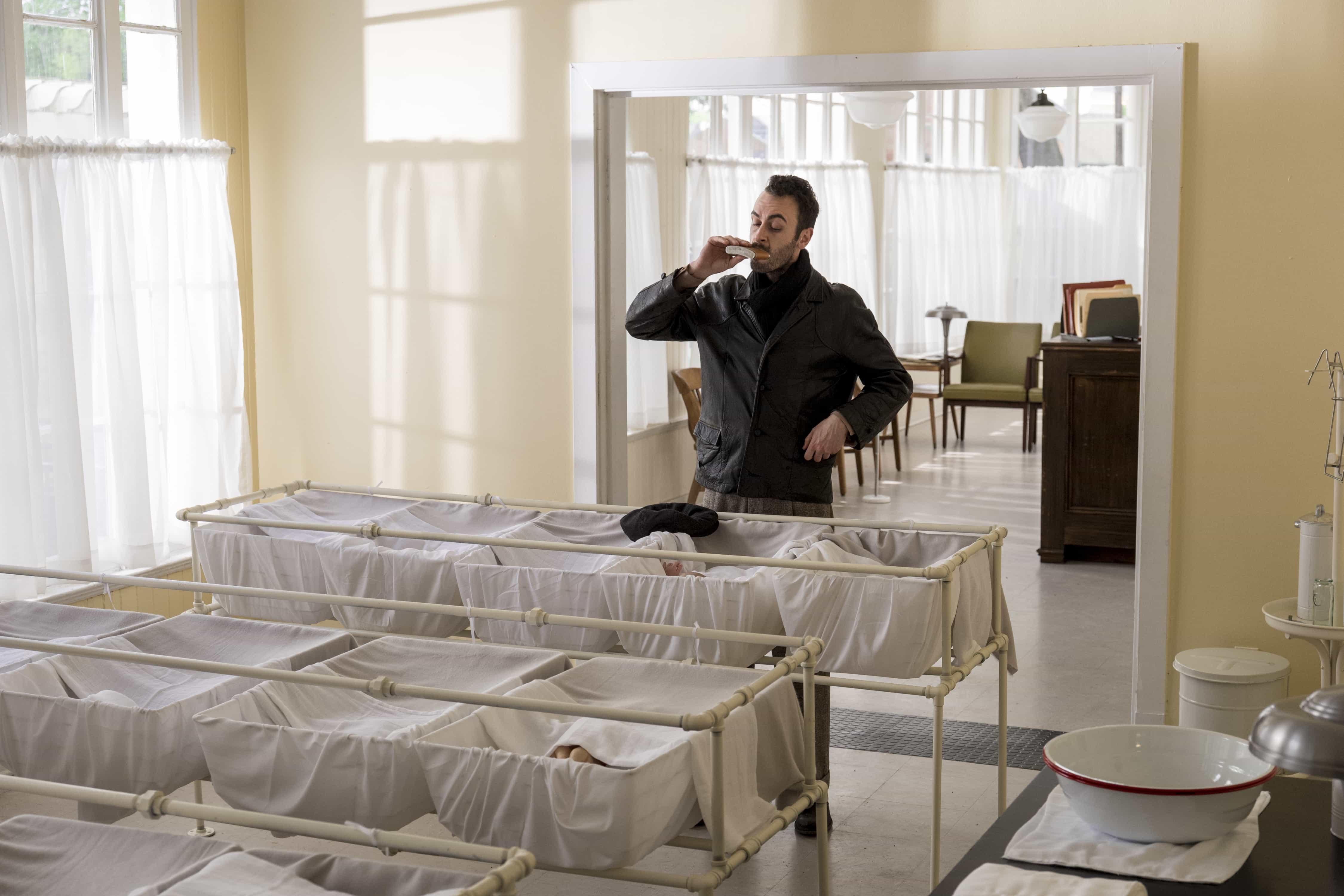
‘Preacher’ breaks our hearts and makes us squirm.
When I’m judging a piece of art, I give a certain amount of credit for novelty. It’s not my only criterion, of course, but I always award points if I’m shown something I’ve never seen before. And never in my life had I seen a man get jacked off to completion while encouraging a teenager to shoot himself in the face.
Until this week.
It takes a lot to make me uncomfortable, but Eugene’s extrapolater scene did it. And I’m glad that it did. I’m happy to know I can still come to Preacher for things I’ve never seen before, for things that make me squirm.
And the scene has just the right kind of outrageousness to counterbalance the weight of a very dark installment.
“Holes” is the name of Preacher‘s seventh episode, as well as the theme of the week. Tulip patches holes. Eugene gets thrown in The Hole. Cassidy contemplates biting holes in Denis’ neck.
But unless we’re counting the hole in the center of his DVD, Jesse is out of the loop, off on his own, which is where he’s been spending a lot of time lately. Ever since he sold a piece of his soul, he’s been the only one focused on finding God, and he’s been drifting further and further from his friends.
Jesse Custer (Dominic Cooper)This is an episode that’s unusually short on character interactions. After splitting up last week to deal with their own problems, our three protagonists continue to exist in their own spheres, each interacting with the other only once. Jesse invites Tulip to the electronics store, Cassidy opens up to Tulip about the pain of immortality, and Jesse refuses to use Genesis to save Denis.
This last interaction is the most telling and the most complex. We’ve seen enough of Genesis’ powers to know that it has a definite monkey’s paw quality to it. The characters know it, too.
Still, Cassidy asks Jesse to use it. Cassidy isn’t out of options—there’s a very obvious and simple way he can save Denis’ life. But he knows being a vampire isn’t all it’s cracked up to be, and he understandably doesn’t want to do it. Instead, he tries to pass the buck on unnatural life-saving techniques. He wants Denis to live, but he doesn’t want to be responsible for the consequences.
It’s a nice effort, but not exactly selfless.
Jesse Custer (Dominic Cooper), Cassidy (Joseph Gilgun)Jesse, meanwhile, doesn’t do much to improve relations with Cassidy. He flat out refuses to help Denis, claiming that he doesn’t think that’s what Genesis is for. To be fair, he’s probably afraid of using Genesis and drawing the Saint back out—he hasn’t used it since he sank him to the bottom of the swamp.
But his use of Genesis has always been as haphazard as his rationale. He won’t use it to save his best friend’s son, but he’ll use it to make a cop sing The Yellow Rose of Texas. To Jesse’s credit, he’s more afraid and tense than he was in that first episode, but his refusal to help Cassidy, who’s seen him use Genesis more than anyone, is bound to weigh heavily between them.
Things are already weighing as heavily as possible between Tulip and Jesse. Tulip is in a terrible state and Jesse doesn’t know what to do. Even though Featherstone is using Tulip, I’m all for this budding friendship if it gets Tulip out of her funk.
Down in Hell, we finally get to check in on Eugene again. Eugene’s doing what he has to in order to survive, but he’s not destined to last. Now that the authorities know someone’s stowing away and Hitler is offering a plan of escape, things are bound to move forward quickly. I can’t wait to see more of Hell.
Adolf Hitler (Noah Taylor)But the star of this episode is Cassidy. First, we see him visiting baby Denis in the hospital 71 years ago, promising to be the best da you’ve ever seen. We then move to the present, where Cassidy is at least fulfilling some of his promise, tending to Denis as he dies.
Cassidy is tired and nostalgic, bringing up his childhood several times, mentioning a mother and a brother. At the very end, he calls up someone named Seamus, who knows his first name is actually Proinsias and is likely the same person he called on the payphone in the pilot episode. It’s a reminder of what was brought up in the very beginning and never again. Cassidy has people somewhere—people who know him and, just maybe, care about him.
And he’s starting to care about his own people. He can’t stand to watch Denis die, and by the end of the episode, it looks like he’s not going to.
The use of Charlotte the Harlot is a beautiful touch, a lovely way to wordlessly convey Cassidy’s emotions and intentions. The song functions as bookends to Denis’ life, sung with hope when he’s a baby and with dark willfulness when he’s dying. Deadbeat dad though he is, Cassidy remembers the day Denis was born, and his reprise of the song he sang that day can only mean one thing.
Denis (Ronald Guttman), Cassidy (Joseph Gilgun)“Holes” is a lovely episode. While the stasis in the search for God is wearing just a little long, the beautiful sadness of Cassidy and Denis’ story and the utter weirdness of Eugene’s adventures in Hell more than make up for it. And now that Featherstone and Hoover have made contact and Herr Starr is on his way, we’re due for some very interesting conflict with the Grail.
And some uncomfortable truths about immortality.
Related Topics: Comics, Preacher

